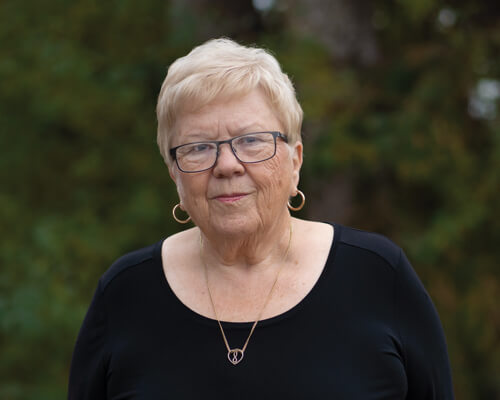Carol-Ann
My husband, Stan was diagnosed with mild cognitive impairment (MCI) in 2010. He was 70 years old at the time. His mother had Alzheimer’s and died in 2008. Stan requested testing for himself within the next year.
We began the process by asking our family doctor for a referral. This meant a specialized nursing team who did the standard testing and arranged a teleconference with a specialist in dementia and geriatric medicine from the hospital in St. Albert, Alberta. From there, we were referred to the Glenrose Rehabilitation Hospital in Edmonton. Here we met with Dr. Freirich and began a brutal five and a half hours of testing with a final meeting between the three of us.
I say “brutal,” because it was. Stan was exhausted and devastated. As was I. No one can imagine the heartbreak of hearing the diagnosis.
Reacting to the diagnosis
Our initial reaction was frightening and devastating. I think we were both aware this was happening to us, but to have it confirmed made it very real. That night, we returned to Grande Prairie through a blinding snowstorm and icy roads. It just seemed urgent we get on the road. That night Stan sobbed and kept saying “I’m so sorry,” over and over. This was the most helpless feeling in the world. I couldn’t make it better.
The healthcare professionals treated us then, and now, with respect. They’ve provided the necessary testing and medication to help with the anxiety, depression and frustration. Stan has had some significant changes in the last few years and we’ve seen a steady decline. He had several falls, one very bad one and a transient ischemic attack (TIA) – possibly more than one – in the past year. CAT scans, bloodwork and x-rays have been done several times.
One of the last visits, we were told he has moderate to severe dementia. Because of his age and condition of his brain, surgery would not go well for him. We were told this will not improve but instead get worse. So as a family, we made the decision to stop further investigation. We will enjoy all the good days and spend quality time with him.
People’s reactions
Our friends were shocked and very sympathetic. At the time, Stan’s symptoms were not that prominent, so unless you spent more than an hour or so with him, it wasn’t that evident. There were signs of memory loss and searching for words, but our friends didn’t treat him or me any differently.
Of course, our family was very upset. We visited numerous websites to find more information regarding diet, exercise and medications. We tried many of them. The decline was very gradual because we kept busy with many projects and lots of travelling. I think this helped slow down the decline.
As the disease has progressed the last two years, the decline has become very noticeable. Now, friends and some extended family will defer conversation to me for answers. Stan is aware of this, and because he must now search for words that are sometimes not there for him, I become the responder. This is awkward for him at times, and he is not comfortable socially.
Facing stigma
The stigma is and always has been awkward, at times embarrassing, because the general public does not realize that Alzheimer’s disease and other dementias are NOT CONTAGIOUS. There is a complete misunderstanding from days gone by that makes people uncomfortable and often with have no idea how to treat people with dementia.
There’s a real feeling that these people are crazy or have lost their minds. This makes me sad and angry. A little bit of knowledge goes a long way. I feel people are very uninformed about dementia. Their definition is very grey. Their comments are rude, cruel and hurtful. Unless they have experienced a loved one with dementia or are living with a person who has dementia, they are not comfortable seeking help or advice.
I too was reluctant to seek help. I thought, “OMG I live with this. Why would I want to listen to other people talk about it?” Going to my first support group was the best thing I have ever experienced. These are trained people with tips and supports I now have access to.
The Alzheimer Society is on the right path to raise awareness. We need many more programs and support groups across Canada. Our healthcare professionals need a clearer understanding of this disease, too.
My biggest regret is not having the ability or chance to have taken part in a clinical trial. These are only offered in large cities, making it very difficult for rural Canada to access any program. From my perspective, there is still a huge stigma attached to anyone who has been diagnosed with dementia of any kind. Sad but true.
My hope for the future is for more care, compassion and understanding. People with dementia did not choose this path. Those of us living with it take one day at a time, enjoying the good days left and keeping our special memories.
Comments
We may use your information in order to track your relationship with us and our site(s). We do NOT share your information with third parties.

Here are my tips to help you understand:
- Treat people with Alzheimer’s and other dementias like real people with respect and understanding. They still have feelings. Speak with them face-to-face because they matter.
- Be patient; they may take longer to process the question and search for the answer.
- Try not to argue or correct. Instead of remembering the answer, they will feel confused or stressed.
- Try not to disagree with their sense of reality. Instead, encourage another topic or ask questions about their past.
- Try to imagine if you or a loved one was faced with this reality.
-
More Stories
-

Roger
2018
Alberta

Lori 1639 days ago
Thank you for sharing Carol. My mother is in early stages and lives in Manitoba, with no close relations to check on her. I sometimes feel guilty and of course helpless that I live in Alberta and cannot be there for her. It is a terrible disease and I thank you for sharing your story. Much love to you.
Tilly Schoonderbeek 1659 days ago
Carol Ann I fully understand how it felt that you hear the results from the test. I remember with my husband that we were told that he has Alzheimer /dementia we have cried for a long time. Yes I wish that people understand the illness but they will only if you get confronted with it. Ans bless your heart to tell this, as I know and understand where we going true. Thank you for sharing this with us.
“Let us help you understand.” Learn how Canadians living with dementia are shining light on the stigma they face. | Alzheimer Society Blog 1664 days ago
[…] Read Carol-Ann’s full story. […]